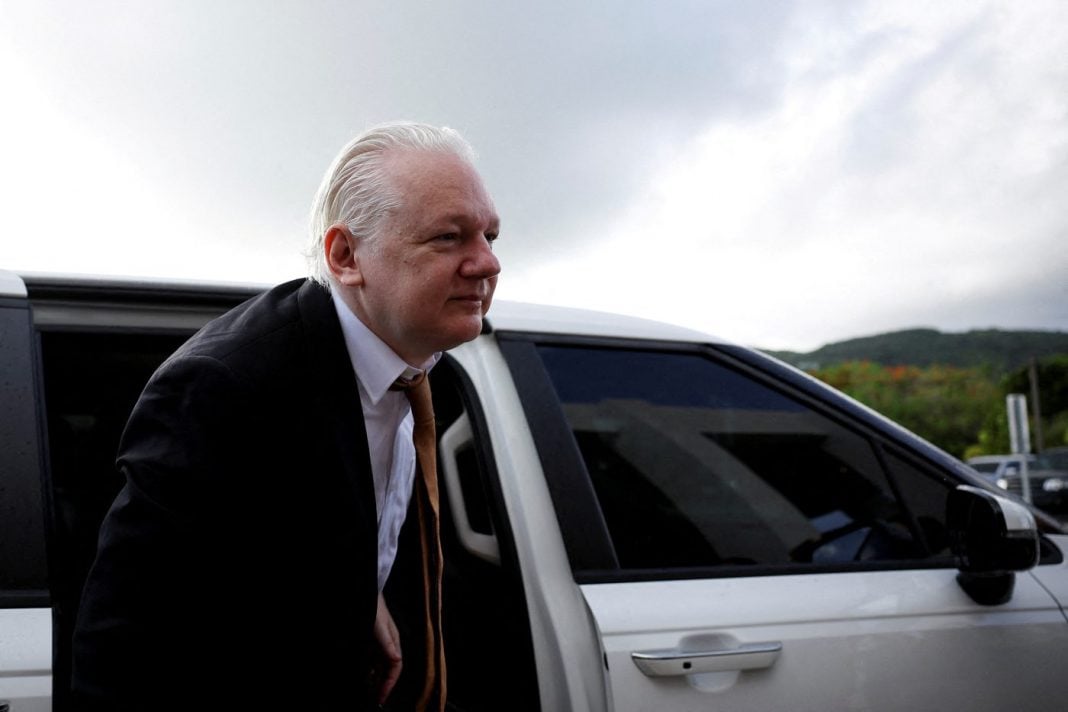By Julia Davis, for CEPA
The Australian hacker Assange has been freed and returned home, but there is no joy among his Russian admirers.
Julian Assange was freed from a British high-security prison on June 25, flown to a US Pacific island, where he pleaded guilty to a charge of espionage and returned home to Australia.
His fans in the West rejoiced, but there was little sign of shared delight in Moscow, where his admirers among the state propaganda classes were aghast.
During the June 26 broadcast of 60 Minutes, state TV host Evgeny Popov described the deal as an utter “humiliation” for Assange and bitterly surmised that “the deep state” had definitely won the battle. Popov said, “Assange was humiliated and squashed, but he is sort of free now.”
During the same show, Putin’s former close advisor Sergey Markov said of Assange: “He crawled on his knees to the boot of the American deep state and kissed it when he admitted that he committed that crime. The boot leniently shook him off, like a half-dead kitten, and told him he could now crawl back into his hole.” Popov wholeheartedly agreed, chiming in, “It couldn’t possibly be said any better than this.”
State TV host Vladimir Solovyov, widely regarded as Russia’s most senior propagandist, seemed to concur and then appeared to completely lose his temper. During his morning show, Full Contact, the host noted, “For some reason, this brought colossal joy to some people. I really don’t understand this . . . American Leviathan has won! They’ve destroyed him.”
He went on: “There was a great legend, there was the great Assange, and Americans have destroyed it!”
Solovyov fumed about the loss of Assange’s credibility and dramatically described Americans as “pig-faced and penguin-faced” and “bastards and scumbags,” periodically screaming at the top of his lungs. Still scarred by the loss of his Italian villa, which was seized by the authorities in 2022 pursuant to sanctions, he raged: “You are thieves! You stole it! And now you’ve also destroyed Assange’s reputation! You, who aren’t worth the dirt under his fingernails!”
The 60-year-old was not done, adding: “I am sad that the American Leviathan has triumphed.”
Solovyev was less harsh on Assange personally, taking the opportunity to applaud his colleague, the head of RT Margarita Simonyan, who as Assange’s former employer at the network had “fought for him.” In the past, Maria Zakharova, spokeswoman for Russia’s Foreign Ministry, frequently cited Assange’s work for RT as the definitive proof he was a real journalist. On many occasions, Simonyan has called Assange “the best journalist of our time.”
Solovyov lambasted everyone who had failed to support Assange as “dandruff in a heap of foul-smelling hair on the Devil’s head” and complained, “They’ve destroyed the legend . . . they’ve destroyed the faith that Leviathan can be defeated.”
Why are these reactions so strong? There are several possible reasons, not least the likely concern among Russian-language state media that information harmful to Moscow may have been disclosed in the course of the Assange plea deal and may yet come to light.
The 52-year-old hacker’s presence in a Western jail has allowed Kremlin propagandists to make a lot of noise about supposed hypocrisy (Assange jumped bail from 2012-2019 and was thereafter remanded in custody to a prison near London). All of which assisted Russian talking points about the fate of anti-establishment journalists, with public predictions by state TV propagandists that Assange would never go free and would instead be assassinated while in custody.
He had become a totemic figure among pro-regime elements in Russia for his involvement with the US election of 2016.
In that year, presidential candidate Donald J. Trump uttered a now-infamous phrase, “Russia, if you’re listening,” urging the Kremlin to find Hillary Clinton’s emails that had been wiped from her server.
The day Trump spoke, Russian government hackers launched an attack against the email accounts of Clinton’s staffers and people involved in her campaign. As the result of the subsequent investigation by Special Counsel Robert S. Mueller III, 12 Russian military intelligence officers were indicted. The men worked for Unit 26165 and Unit 74455 of the Russian government’s Main Intelligence Directorate.
The latter unit, also known as the Main Center for Special Technology, organized the release of the stolen emails through a website it created called DCLeaks and the online persona Guccifer 2.0. According to the indictment, WikiLeaks sent a private message to Guccifer 2.0, asking for access to the material and promising that “it will have a much higher impact” on its website.
The indictment further detailed how the Russians delivered their trove of hacked emails to WikiLeaks, using an encrypted file with instructions. Assange’s website became one of the main platforms where hacked emails were publicly displayed.
The Australian would argue that he acted as a journalist throughout and rejected suggestions he had been in cahoots with Russian intelligence agents. His critics beg to differ. They note that Assange rejected offers to publicize huge hacks of Russian government data in 2016.
Those connections may help to explain the residual warmth Simonyan still feels for Assange. In 2019, she said: “There is no safe place on earth for anyone who managed to seriously harm the United States of America, except for Russia.” She regretted that Assange had not gone to the Russian embassy” adding, “I would have told him to.”
The hacker would then have joined another fugitive from US justice, the National Security Agency contractor Edward Snowden, who leaked vast amounts of secret data in 2013, fled the country and took Russian citizenship a few months after the Kremlin launched its all-out war against Ukraine.
Meanwhile, on June 26 the closed trial of the falsely accused Wall Street Journal reporter Evan Gershkovich began in Yekaterinburg. Russia’s deputy foreign minister skimmed over the claims of America’s supposed espionage, instead appealing to the US to note Russia’s “signals” to agree to a prisoner swap.
By Julia Davis, for CEPA
Julia Davis is a columnist for The Daily Beast and the creator of the Russian Media Monitor. She is a member of the Academy of Television Arts and Sciences, the Screen Actors Guild, and Women In Film.
Europe’s Edge is CEPA’s online journal covering critical topics on the foreign policy docket across Europe and North America. All opinions are those of the author and do not necessarily represent the position or views of the institutions they represent or the Center for European Policy Analysis.





